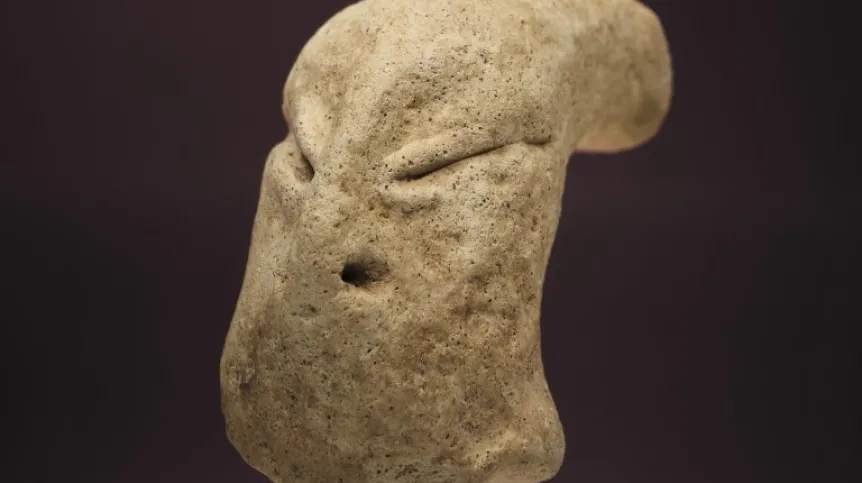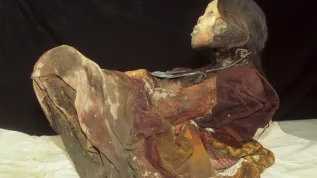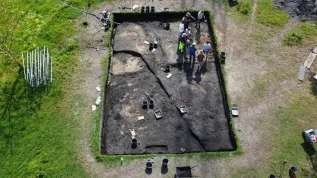
A team of Polish archaeologists, working in collaboration with Kuwaiti researchers, has uncovered a treasure trove of ancient artifacts at the Bahra 1 site in northern Kuwait, providing a rare glimpse into life on the Arabian Peninsula over 7,000 years ago.
The figurine, a finely crafted clay head, and the discovery of locally produced pottery are shedding new light on the region’s early human settlements. The findings, made at a site dating back to the mid-6th millennium BCE, further establish Bahra 1 as one of the oldest and most significant archaeological locations on the Arabian Peninsula.
Since 2009, the Bahra 1 excavation has been a joint effort between the Polish Centre of Mediterranean Archaeology at the University of Warsaw (PCMA UW) and Kuwait’s National Council of Culture, Arts, and Letters (NCCAL). The site is of particular interest to archaeologists studying the interactions between Arabian Neolithic societies and the Ubaid culture – a Mesopotamian civilization that spread across a vast territory, from Anatolia to the Arabian Peninsula.

‘This season’s excavations have provided invaluable new data, enhancing our understanding of the cultural exchanges between these ancient peoples,’ said PCMA UW in a statement.
One of the most remarkable finds at Bahra 1 is a small, anthropomorphic figurine made of clay. With its elongated skull, slanted eyes, and flat nose, the figurine bears strong similarities to those associated with the Ubaid culture, which dominated Mesopotamia around 5,000 BCE. Such figurines have been found in both domestic and funerary contexts in Mesopotamia, but this discovery at Bahra 1 is the first of its kind in the Gulf region.
'The presence of this figurine raises intriguing questions about its symbolic or ritualistic role in the ancient community,’ said Professor Piotr Bieliński, head of the Polish archaeological team. ‘Its exact purpose remains a mystery, but its craftsmanship and distinct features suggest it was an important cultural object.’
In addition to the figurine, the excavation team has made another groundbreaking discovery: evidence of local pottery production at Bahra 1. Previously, researchers knew that pottery found at the site included both imported Ubaid ware from Mesopotamia and a locally made type known as Coarse Red Ware (CRW), a distinctive pottery style found across the Arabian Peninsula. However, the exact location of its production had remained uncertain.

Now, thanks to the new discovery of an unfired clay vessel and scientific analyses led by Professor Anna Smogorzewska, researchers have confirmed that Bahra 1 is the oldest known site for local pottery production in the Gulf region.
The discovery of CRW pottery marks a significant development in understanding the economic and social dynamics of the early inhabitants of the Arabian Peninsula. The existence of a local pottery production hub suggests that the people of Bahra 1 had developed sophisticated techniques for crafting everyday items, such as cooking vessels and storage jars, using locally sourced materials.

Further analysis of the pottery has revealed traces of plants embedded in the clay, providing insight into the local environment during the time of the settlement. According to archaeobotany experts Aldona Mueller-Bieniek, PhD, and Roman Hovsepyan, PhD, early analyses have identified organic remains of wild plants, particularly reed, in the locally produced CRW pottery.
The imported Ubaid ware also showed traces of cultivated plants, such as barley and wheat – an indication that the Ubaid culture not only traded goods but also exchanged agricultural practices with the peoples of the Arabian Peninsula.
‘This is an exciting development,’ said Hovsepyan. ‘The evidence of cultivated plants in the imported pottery highlights the importance of agricultural exchange between Mesopotamia and the Arabian Peninsula during the Neolithic period.’
The research team is led by Professor Piotr Bieliński of PCMA UW, with Agnieszka Pieńkowska, PhD, acting as the excavation director for this season. Kuwaiti collaborators, including Mohammad ben Redha, General Director of the Department of Antiquities and Museums of NCCAL, have been instrumental in supporting the excavation.
PAP - Science in Poland
ekr/ agt/ kap/
tr. RL













